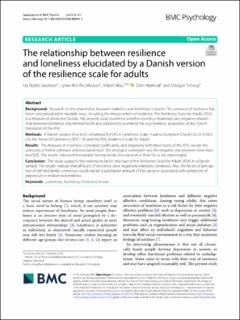The relationship between resilience and loneliness elucidated by a Danish version of the resilience scale for adults
Peer reviewed, Journal article
Published version

Åpne
Permanent lenke
https://hdl.handle.net/11250/2722278Utgivelsesdato
2020Metadata
Vis full innførselSamlinger
- Institutt for psykologi [3103]
- Publikasjoner fra CRIStin - NTNU [38127]
Sammendrag
Background: Research on the relationship between resilience and loneliness is sparse. The construct of resilience has been conceptualized in multiple ways, including the measurement of resilience. The Resilience Scale for Adults (RSA) is a measure of protective factors. The present study examined whether resiliency moderates any negative relationship between loneliness and mental health and additionally examined the psychometric properties of the Danish translation of the RSA. Methods: A Danish sample (N = 422) completed the UCLA Loneliness Scale, Hopkins Symptom Check List-25 (HSCL- 25), the Sense of Coherence (SOC-13), and the RSA, Resilience Scale for Adults. Results: The measure of loneliness correlated significantly and negatively with most facets of the RSA, except the subscales of family cohesion and structured style. The strongest correlation was the negative one between loneliness and SOC. The results indicated that people feeling lonely also experience their life as less meaningful. Conclusion: The study supports the existing six-factor structure of the Resilience Scale for Adults (RSA) in a Danish sample. The results indicate that all facets of resiliency were negatively related to loneliness. Also, the facets of perception of self and family coherence could explain a substantial amount of the variance associated with symptoms of depression in relation to loneliness.
